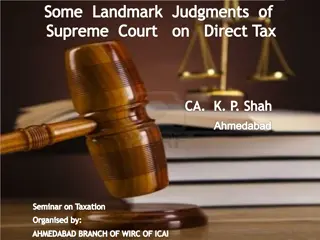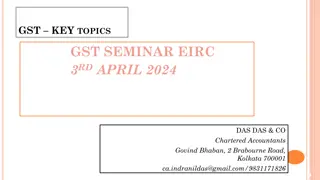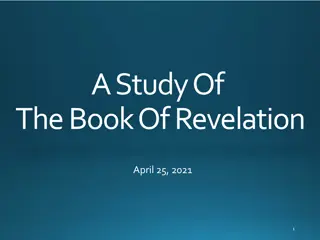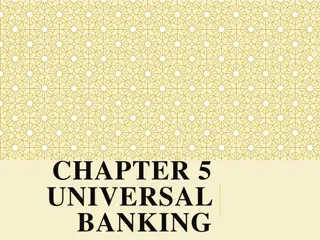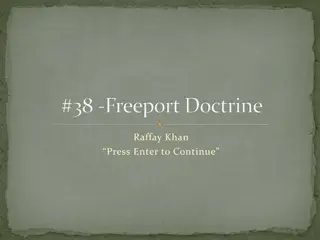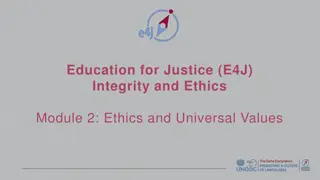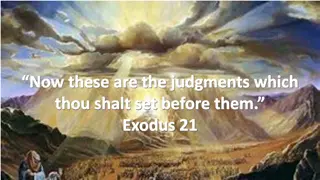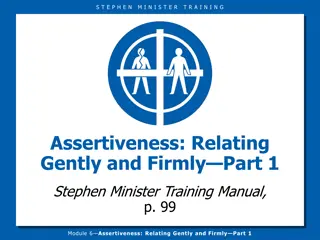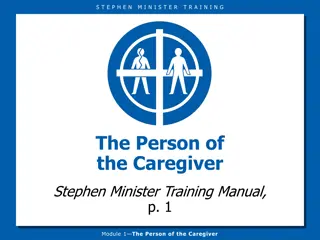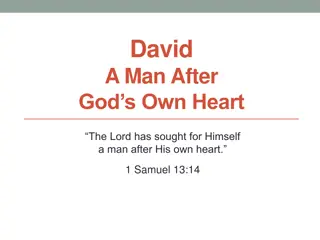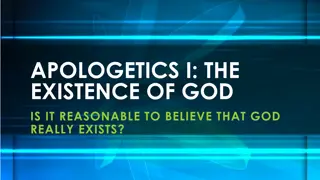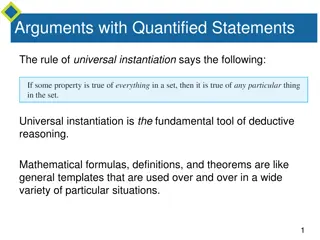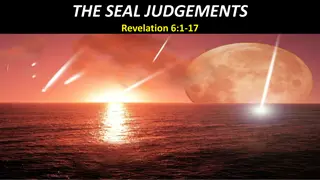Stephen's History: God's Universal Presence and Judgments
Trial and execution of Stephen unfolds as he argues about God's appearances outside Israel, the rejection by Jews, and judgments on nations. Abraham, Isaac, and Jacob's faith without a Temple but with God's presence. God judges slowly but justly, as seen in the fates of Egypt and the Amorites. Joseph's story showcases God's favor beyond traditional norms.
Download Presentation

Please find below an Image/Link to download the presentation.
The content on the website is provided AS IS for your information and personal use only. It may not be sold, licensed, or shared on other websites without obtaining consent from the author.If you encounter any issues during the download, it is possible that the publisher has removed the file from their server.
You are allowed to download the files provided on this website for personal or commercial use, subject to the condition that they are used lawfully. All files are the property of their respective owners.
The content on the website is provided AS IS for your information and personal use only. It may not be sold, licensed, or shared on other websites without obtaining consent from the author.
E N D
Presentation Transcript
Acts 7 Trial and Execution of Stephen
Stephens History of the Jews God always appears and does miracles outside of Israel and away from the Temple. The Jews always resist the Holy Spirit The Jews reject the miracle-working Redeemer from the desert: Both Version 1 - Moses and Version 2 - Jesus God does not dwell in temples made by human hands They were really worshipping Moloch and the stars of Heaven (In their heart) They always rebelled against the True Presence of God They murdered all of the true prophets They refused to keep the law ordained by angels.
God Appears to Abraham (v. 1-3) The High Priest asks Stephen if the accusations were true. Stephen argues by analogy Stephen starts with Abraham and the fact that God appeared to Abraham in Mesopotamia, in Ur of the Chaldees. God s significant interaction with Abraham happens beyond the borders of Israel. God is thus universal. God is acting outside of the Temple and the priests. The God of glory is speaking to a non-Jew (Abraham) in a foreign land. (Jews are only the descendants of Jacob) God is universal, spiritual and directly personal not local, institutional and mediated by a priesthood.
Sojourners (v. 4-6) Abraham, Isaac and Jacob lived in tents without getting a single foot of the promised land. They were then oppressed in Egypt for 400 years. All this time, God was with them and yet there was no Temple and no permanent form of worship. God was formless, stateless, personal, and covenantal God was not less God for being without the conventional trappings of religion. God was a God of promises, and not of premises! into this land in which you are living the promises came true!
I Will Judge That Nation. (v.7) God s judgments are slow but sure and may take generations. God does not judge individuals He also judges cities and nations. Egypt took 400 years of oppressing Israel to be judged The Amorites took 440 years of idolatry and child sacrifice to be judged. Israel took 400 or so years from Solomon s idolatry to the Babylonian exile to be judged. God is just but gives ample time and warning to repent, even for wicked people such as those of Nineveh
God Was With Joseph ((v. 8-10) God is with Joseph and rescues him out of all of his afflictions and places him in a high position in Egypt. Destiny does not depend on location Destiny does not depend on being in favor with the consensus of sons of Jacob (the Jews) The Jews are not God s gatekeepers, God alone favors those whom He will favor. God was obviously with the new Christian movement in Jerusalem as evidenced by signs and wonders. Here Joseph is being presented as a type of Christ raised from the dead and given authority.
The Famine and Following (v. 11-16) There is a contraction of the two caves here, Abraham s in Macpelah and Jacob s in Shechem (Samaritan territory) The patriarchs were buried among the despised Samaritans. One possible explanation: Stephen as a Greek-speaking Jew may have had slightly less knowledge of the O.T. The patriarchs were still unsettled. They knew their spiritual home was Canaan but they were stuck in Egypt .
Opposition To The Promise (v17-19) As the promise draws near, the persecution increases. As the promise of Christ drew near Roman oppression, slaughter of the infants etc. Our promises are opposed by Satan Yet God s promises come true! The Tribulation before the Return of Christ Through many tribulations we enter into the Kingdom of God. All who live godly in Christ Jesus will be persecuted. Also with Joseph Pslam 105:18-20 the word of the Lord tested him.
Moses At Court Moses was educated by pagans and was learned in all the wisdom of the Egyptians . Again God is raising people up outside of the Jewish system. God is with Moses and sees him as beautiful despite his unclean pagan environment. Moses was might in his words and deeds PRIOR to leaving for Midian. God had formed Moses into a very powerful person and blessed him as a result of faith, promise and covenant relationship.
The Jews Refuse Their Deliverer (v.23-29) Moses slays the Egyptian and expects the Jews to follow him. The Israelites refuse the leadership of Moses saying who made you a prince and judge over us? (God) see v35. They say the exact same things for the next 80 years always questioning Moses! The Jews refuse their Redeemer! (type of Christ) In Jewish tradition the two squabbling men were Dathan and Abiram (later judged in the wilderness) Moses then dwells in Midian (traditional enemies of Israel)
The Burning Bush (v. 30-32) God is personal and covenantal and relational the God of Abraham, Isaac and Jacob God is both mysterious and natural. Mysterious in the ore, natural in appearing in the countryside in a burning bush and not in any so-called holy artifact. God acts according to His timetable alone after 40 years were fulfilled . Stubbornly rejecting deliverance added 80 years to Israel s suffering the first 40 while Moses languished in Midian, the second 40 years was wandering in the Wilderness. Moses trembled and dared not look! Moses rightly feared and obeyed the direct voice and call of God (in contrast to the stubborn Jews)
Holy Ground (v. 33) Moses was standing on holy ground in Midian! There is holy ground all around the world, not just in Israel, holy = sanctified by the universal God Himself! However not all places are holy! Some, such as Tophet, have demonic connotations. Places can connect with various spiritual realities. Graves are often seen as places of spiritual power. The holy ground was quite normal in appearance and had no physical structure, no altar no stained glass windows etc.
I Have Seen Their Affliction. (v.34) God was always aware of their affliction but now was the time of faith, and of promise and of deliverance. Like Joseph in the dungeon, Israel had to wait until the time of promise. God chooses to deliver Israel DESPITE their unbelief! I have seen, I have heard, I have come down, I will send.. The deliverance is ENTIRELY God s initiative, not that of Moses or of Israel. Parallel to God sending Jesus at the appointed time
This Moses They Refused (v.35,36) Moses, the rejected Moses, the stone rejected by the builders, becomes the chief cornerstone, works miracles for forty years and delivers Israel. Jesus is also the rejected Savior, who works signs and wonders and he in turn is rejected by Israel. This begins a series of verses demonstrating a strong parallel between the Jews rejection of Moses and their rejection of Christ one like unto Moses The flesh always rejects and persecutes the Spirit. Galatians 3:3, 4:29, 5:16-18 Demonstrates a hard-hearted spirit of rebellion. John 8:46,47
A Prophet Like Moses (v.37) Deuteronomy 18:15-19, Acts 3:22,23 Jesus is the prophet like Moses, who was rejected like Moses. The whole Sanhedrin gets this point because they knew this prophecy in-depth. Peter and John had also pointed to Jesus as the fulfillment of this prophecy earlier in their presence. They knew were awesome consequences for rejecting the Moses-like prophet. Many of the priests had believed thus there must have been considerable debate about Jesus being the Prophet.
Turning Away (v.38-41) The Israelites turned away from the holy Word of God spoken through an Angel on Mt. Sinai. (v.38) They rebelled against this Moses a phrase that suggests Moses was different from them, of another nature. Self-centered idolatry is that natural state of fallen humanity, it feels normal and Moses seemed strange They built a golden calf they felt comfortable with. There is a danger in seeker-sensitive approaches that they adopt sinful and idolatrous cultural norms. They turned back to Egypt in their hearts They rejoiced in the works of their own hands!
Serving The Host of Heaven (v42,43) Serving the demons of the second Heaven who pose as astrological beings. Spiritual beings far less than God. Have strict rules and taboos, very fearful and enslaving in the end (but sometimes attractive at first) Serving Feng-Shui, astrology, divination, the occult, etc. Often associated with propitious times and an astrological calendar. Galatians 4:10 Seems to have been a problem in Colossae (Colossians 2:8-23) and resulted in legalism and taboos Repulsive to God, Stephen quotes Amos, God would send them beyond Babylon may have been referring to Kabbalistic Jewish mysticism which incorporated these forbidden deities (Moloch, Remphan etc)
Tabernacle vs. Temple (v44-47) The Tabernacle was built according to the God-given pattern and gave Israel victory and enabled Joshua to conquer Canaan The SolomonicTemple soon became filled with idols and only ensnared Israel into defeat and into a divided Kingdom. Solomon is viewed very negatively by Stephen. Stephen is directing a clear shot at grandiose institutionalized religion and its idolatrous excesses. Building programs are often the end of spiritual life (but not always) because they tend to create temple structures rather than flexible Spirit-filled tabernacle structures. Temple structures tend to bring human wisdom and human politics into God s work. The Temple is apart from the people rather than among the people. Jesus tabernacled with us!
God Is Not In The Temple (v. 48-50) Demons dwell in temples, as will the Anti-Christ (2 Thessalonians 2:4) God does NOT dwell in temples made with human hands God has no need of religious service. (Acts 17:24-25) God dwells in people and His Church as His temple (1 Corinthians 3:16, 6:19, 2Corinthians 6:16) There is no temple in the eternal state but rather direct relationship with Abba Father God (Revelation 21:22) God is the Creator who CANNOT be confined in human buildings or systems or priesthoods or hierarchies of religion!
As Your Fathers Did So Do You! (v. 51) Jesus accuses the Sanhedrin of resisting the Holy Spirit, just as their fathers had done! Whatever God wanted, they opposed. They wrestled against God, constantly. To obey God was a kind of defeat to their stiff-necked, hard-headed pride. Uncircumcised in heart and ears: unwilling to truly listen to God, unclean inside, like pagans. Christo-paganism: Christian on the outside, pagan on the inside. Post-modernism, liberal Christianity, worldliness. The Sanhedrin had resisted the evidence of the miracles of Jesus, of the the lame man, Peter s mass healings, Stephen s signs and wonders and now Stephen s face and testimony.
Murderers! (v.52,53) Stephen reaches his finale accusing them of persecuting the prophets and of murdering the Just One (Jesus) The accusation of ignoring the Law ordained by angels was probably aimed at the Pharisees who believed strongly in angels. A strong parallel with Jesus final rebuke of the Scribes and Pharisees in Matthew 23:29-39 The clash between fallen religious/philosophical spirits and the Holy Spirit is so intense that it frequently results in murder (e.g. the persecuted Church around the world today)
A Spiritual Explosion! (v54-57) The demonically-driven Sanhedrin can take no more of Stephen s testimony, they lose all reason and control and murder Stephen and start on a rampage against the Church which forces most Christians out of Jerusalem. This is happening in the Middle East today! The demonic forces could no longer take the powerful Christian witness and the human spirit within the distinguished Council members collapsed under the rage of the evil spirits within them. Stephen testifies to the risen, ascended and authoritative Christ which causes a simultaneous evil mass reaction.
Outside The City (v. 58) Stephen is executed outside the city (as was Jesus) It was mob justice without any formal verdict. It was both a spiritual and legal breakdown It was clearly a gross injustice Saul / Paul was a young man at the time and so did not participate in the stoning but rather guarded the clothes Saul clearly approved of the action. Later Saul becomes an enraged persecutor of the Church (Acts 22:19, 26:9-11) This is the great religious lie that cruelty perpetrated for the Lord is justified.
Stephens Saintly Response (v. 59,60) Stephen follows Jesus example in two clear aspects: a) confidently releasing his spirit to God b) in praying for God to forgive his executioners. Stephen saw the injustice as sin but asked that the sin escape punishment (be not held against them). He said it loudly as one in an extreme situation. Stephen also showed confidence in the divinity of Christ by praying Lord Jesus, receive my spirit.. This is a clear example of early Christians praying to Jesus as God and shows that the Trinity was not a much later doctrine. This is reacting in the opposite spirit to insults and injustices and is a mark of a truly Spirit-filled Christian.


